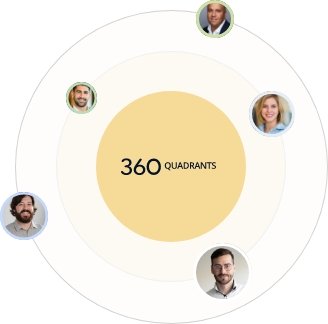Top Data Fabric Software Features
Data fabric is a platform that enables organizations to manage data effectively. It has the ability to integrate multiple applications and tools needed for accessing the data for real-time streaming and analysis. By collecting the raw data and converting it into the useful one it helps organizations to manage data in an efficient way. Data fabric software comes with multiple advanced traits that enable data management for organizations.
- Data Discovery
- Data Governance
- Data Integration
- Data Lineage
- Data Orchestration
- Data Quality
- Data Security
- Data Transformation
- Data Visualization
- Distributed Computing
- In-Memory Data Access
- Metadata Management
Top 10 Data Fabric Software
Is Data Fabric fascinating software? Data Fabric software being implemented by loads of organizations nowadays, so getting the desired software can be a strenuous task. More numerous investments and large-scale business cooperation are likely to take place early, based on creativity. Some of the big players at the moment are:
- Global IDS
- Denodo
- Oracle Corporation
- IBM Corporation
- Informatica Corporation
- Netapp Inc.
- HPE
- Talend
- Software AG
- Vmware Inc.
Top Startups
Emerging firms have offerings for niche products and services. Their business tactics aren't as powerful as the established companies. The evolving vendors include the new market entrants, beginning to emerge in terms of product portfolio and geographical coverage, and need time to gain strong market popularity. Some of the emerging new entrants are:
- Mutable
- AI
- EdgeConneX
- Hangar
- Kontron
- German Edge Cloud
- EdgeInfra
Data fabric is a distributed data management platform that enables organizations to integrate various data management processes, including data access, data discovery, data orchestration, data processing, data ingestion, data analytics, and data visualization. It brings together, disparate data sets, both historical and real-time, and automatically processes them in in an efficient way to deliver a comprehensive view of customer and business data across an organization.
The competitive landscape includes the analysis of business strategies and product offerings of the key players in the Data Fabric market. The vendors are placed into four categories based on their performance in each criterion: Visionary Leaders, Innovators, Emerging, and Dynamic. We have evaluated the top 23 vendors that include Datera, Denodo Technologies, Global IDs, GridGain Systems, HP Enterprise, IBM Corporation, Informatica Corporation, K2View, NetApp, Oracle Corporation, Paxata, Plexxi, Saagie, SAP SE, Software AG, Splunk, Syncsort, Talend, Teradata Corporation, Tervela, Veritas, VMware, and Waterline Data.
Vendors who fall into this category receive high scores for most evaluation criteria. They have a strong and established product portfolio and have a very strong market presence. They provide mature and reputable data fabric tools. They also have strong business strategies
They are established vendors with very strong business strategies. However, they are low in product portfolio. They focus on a specific type of technology related to the product.
Innovators in the MicroQuadrant are vendors that have demonstrated substantial product innovations as compared to their competitors. They have very focused product portfolio. However, they do not have a very strong growth strategy for their overall business.
They are vendors with niche product offering and are starting to gain their position in the market. They do not have much strong business strategies as compared to other established vendors. They might be new entrants in the market and require some more time before getting significant traction.
Best Data Fabric Software
 Analysts
Analysts 


